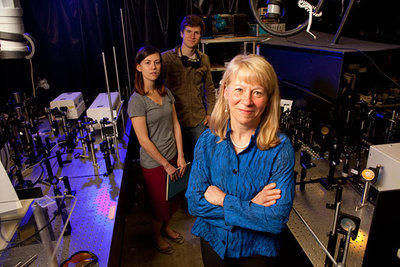
Other schools may get more recognition for science, but the president of the American Association for the Advancement of Science, the world’s largest general scientific organization, is UO chemistry professor Geri Richmond. She’s also on the National Science Board, which governs the largest science funding organization in the U.S., the National Science Foundation.
Showing the importance of scientific exploration and then landing funding for that exploration are big challenges, Richmond says. If 10 to 20 percent of funded experiments prove worthwhile, she says, that’s a huge success, but there’s no way to tell which studies will yield valuable results. “I don’t believe that the federal government should be funding everything out there that somebody has a curiosity about,” she adds, “but I believe that we have the structure in place to be able to evaluate what the best curiosities are to explore.”
Richmond is also co-founder and chair of COACh, which helps advance the careers of women scientists. The organization has worked with more than 10,000 women in the U.S., and Richmond is now proceeding with an international focus. “We’ve been going into countries in Africa, Asia and Latin America to talk to government officials and women scientists about what the needs are for advancing women’s careers in science and engineering,” she says. “After we go into a country and have that kind of a dialogue and if they express interest in doing a partnership, then we go out and try to find money to allow us to develop projects in those countries.” COACh now has projects in developmental or beginning stages in Africa, Asia and South America.
Back at UO, Richmond’s group studies the surfaces of liquids, including water, and how they interact with their environments. “We study a lot of important environmental processes that happen in the atmosphere, such as pollutants adsorbing onto atmospheric particulates and clouds, to try to understand the chemistry that happens on those surfaces,” Richmond says. Such studies include work on how to build a better solar cell, what substances work best at cleaning oil spills and what makes auto oil more effective.
To make it in science, technology, engineering and math, young scientists should work hard and be persistent, Richmond says. “Most important, when you make judgments about your career and career choices, do it when you’re at the top of your game,” she continues. “Don’t make decisions when you’re unsure of yourself or you just had a bad exam. Make your decisions about your career choices when you’ve just aced an exam or done something you’re really proud of.
“I think oftentimes the worst choices that we make are ones we make when we’re not feeling very good about ourselves,” Richmond concludes. “That, then, has repercussions for a very long time.”